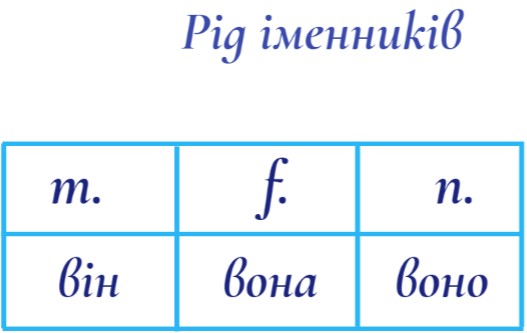
The nouns in Ukrainian language are divided into three genders: masculine, feminine and neuter. But how to understand what gender each noun has? The answer is: look at the word’s ending.
The vast majority of nouns in Ukrainian have gender according to the ending of their Nominative case form (you will find it in the dictionary)
Here are some basic rules, although exceptions exist:
Masculine gender:
(Чоловічий рід)
| Ending | Example |
| –consonant | дім – house телефо́н – telephone стіл – table |
| -й | чай – tea музе́й – museum |
| -ь | день – day хло́пець – boy |
Exceptions:
| Male people | ба́тько – father дя́дько – uncle Мико́ла – man’s name etc. |
Feminine gender:
(Жіночий рід)
| Ending | Example |
| -a | маши́на – car кни́га – book ка́ва – coffee |
| -я | Земля́ – Earth істо́рія – histiry, story |
Exceptions:
| любо́в – love кров – blood ніч – night річ – thing | |
| Abstract nouns: -ість | ра́дість – joy ніжність – tenderness |
Neuter gender:
(Середній рід)
| Ending | Example |
| -o | вікно́ – window не́бо – sky |
| -e | Со́нце – Sun мо́ре – sea |
Exceptions:
| ім’я́ – name ща́стя – happiness | |
| -ння -ття | завда́ння – task життя́ – life |
| Small animals: -a –я | кошеня́ – kitten лоша́ – baby hourse курча́ – baby chicken |
Note:
- Some words can be masculine and feminine at the same time: коле́га
- Nouns ending in the consonant can be either masculine or feminine: дім (masculine), ніч (feminine). You should memorize them.
Exercise:
Name the gender of each noun: дата, небо, будинок, крісло, місто, країна, тато, слово, словник, молоко, музика, сік, ваза, документ, радіо, лист.

This course course will help you to start learning Ukrainian in easy and convenient way. You will learn how to read in Ukrainian and understand spoken language, learn basic grammar, vocabulary and useful phrases.
All materials (vocabulary lists, grammar explanation, texts, dialogues, audios, tests and practice exercises with answers) are on our website, so you can access them whenever you want.
